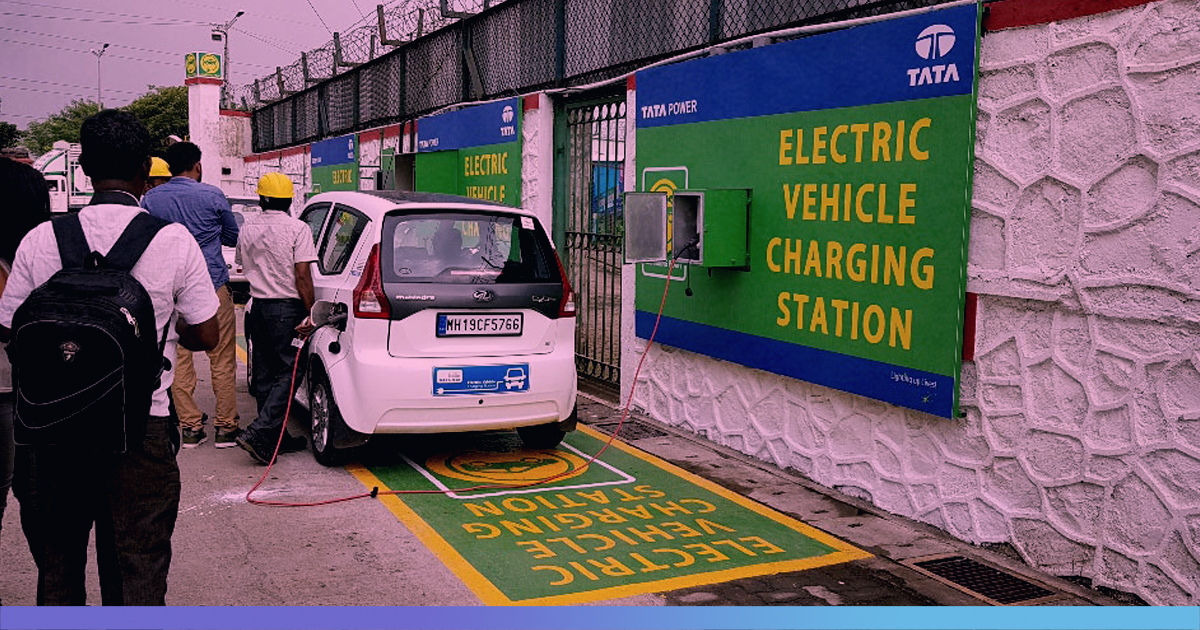In an attempt to boost the use of electric vehicles (EVs), the Indian Government aims to develop a framework for battery manufacturing and charging infrastructure, the Economic Times reported.
Petrol Pumps To Charge EVs
The plan involves the use of petrol pumps as electric vehicle charging points. This came after the decision to allow the sale of only electric three-wheelers by 2023 and two-wheelers by 2025.
“There is the question of lack of charging points across the country. We are looking at how we can get petrol pumps to have charging stations. Once you have a network of charging stations across the country, it will promote the use of electric vehicles,” a senior official told The Times Of India.
At present, there are nearly 60,000 petrol pumps funded by state-run firms. Several private firms also operate gas stations across different parts of the country.
Push For EVs
The government is actively working on promoting renewable energy sources to curb pollution and to minimise its oil import bill. With a phased rollout of the Electric Vehicle Programme, the Government is trying to limit the sale of EVs in highly polluted metropolitan cities.
A committee headed by Niti Aayog Chief Executive Amitabh Kant had prepared a road map for the rollout of electric vehicles in a phased manner, and also the introduction of battery manufacturing factories to minimise the cost of EVs.
According to a notification put out by the Ministry of Road, Transport and Highway led by Union Minister Nitin Gadkari earlier this month, all the electric vehicles will be exempted from paying road tax for vehicle registration.
The exemption of road tax will apply to all categories of electric vehicles — two-wheelers, three-wheelers and four-wheelers sold in India. There will be no renewal fees for existing vehicles, while new ones will not have to pay fees.
The government may also bring down customs duties on EV components, such as brake systems, electric compressors, chargers and battery packs, which currently demand about 15 percent GST.
FAME Scheme
FAME (Faster Adoption & Manufacturing go Hybrid and Electric Vehicles) India, under the National Electric Mobility Mission Plan (NEMMP), was launched by the government in 2015. Under the NEMMP scheme, the government was expected to invest about Rs 14,000 crore in developing infrastructure and promoting the use of eco-friendly electric vehicles.
Phase I of the FAME-India Scheme was launched for two years between April 1, 2015, and March 31, 2017, at an approved amount of Rs 795 crore. The scheme was later extended for six months till September 30, 2017, and then again till March 31, 2018.
India had offered extensive support to the electric vehicle industry towards the end of 2010, with the new renewable energy ministry announcing Rs 95-crore incentive scheme for manufacturers. Import duty on batteries was reduced to 4% from 26%. Price rebates of up to 20% were announced, subject to a maximum of Rs 1 lakh for an electric car.
Cab Aggregator Platforms
The government of India is planning to direct cab aggregator platforms like Ola and Uber to convert 40% of their cars to electric vehicles by 2026.
In a meeting held on May 28, Niti Aayog officials and the ministries of road transport, power, renewable energy and steel, as well as the departments of heavy industries and trade focused on the need for switching to electric vehicles.
State governments are also shifting to several initiatives to boost e-mobility. The Delhi state government is planning to promote the use of electric vehicles by various online consumer service platforms such as Amazon, Zomato, LensKart and Grofers for deliveries to consumers. US-based Uber is also strengthening its electric mobility mark in India.
The Department of Heavy Industries has called for suggestions from the state transport departments to fulfil the supply of 5K electric buses, under the Fame II scheme.
Also Read Around 54 Thousand Mangroves Will Be Cut To Build The Mumbai-Ahmedabad Bullet Train Project











